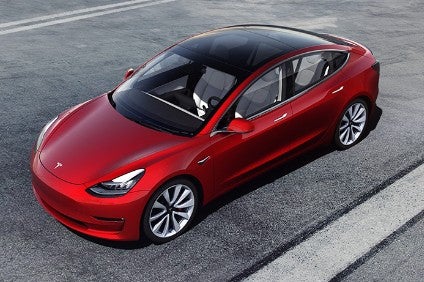
A total of 1,205,387 pure electric passenger cars was registered in 2021, according to JATO Dynamics data for 28 European markets. This was 63% more than the 739,329 units registered in 2020, and 3.4 times higher than the 2019 total.
Felipe Munoz, global analyst, said: “Over the last 10 years, pure electric cars have grown faster than any other segment, including SUVs which posted a new record last year.”

Discover B2B Marketing That Performs
Combine business intelligence and editorial excellence to reach engaged professionals across 36 leading media platforms.
In 2018, BEVs represented just 1.3% of all new passenger cars registered in Europe. This jumped to 2.3% in 2019, and to 6.2% in 2020 during the worst period of the pandemic.
Munoz added: “Due to this rapid growth, EVs now have an established foothold in Europe. And despite the challenges last year, their popularity has continued to grow, accounting for 10.3% of the market in 2021.”
The increased popularity of EVs in 2021 was driven by two key factors. Firstly, the continued availability of generous government incentives resulted in an uptick in demand as more consumers began to see the vehicles as a real alternatve to traditional ICE models. And secondly, due to the global shortage of semiconductors, many OEMs priotised EV sales, along with SUVs, over petrol and diesel vehicles meaning dealerships faced less disruption with supply.
Second largest BEV market
Last year, Europe consolidated its position as the world’s second largest market for BEVs both in terms of volume and market share, behind China which saw a 12.3% total market share for these vehicles.
Munoz said: “Europe’s results are encouraging given how expensive EVs are when compared to their Chinese counterparts.”
The efforts of OEMs to expand their EV model lines has given European consumers more choice than ever before. For example, in 2018 there were 28 different electric models available in the market. The offer increased to 33 in 2019, and to 57 in 2020. Last year, consumers in Europe could chose from 74 different electric models.
Tesla up 70% but VW lead
As the European EV offer has grown, so has the competition and Tesla no longer holds such a dominant position within the market. Two years ago, the US manufacturer held a 31% share of the BEV market, thanks largely to the arrival of the Model 3. In 2021, Tesla was the most popular BEV brand with 167,549 units across 28 European markets, however its market share fell to 13.9%.
Munoz said: “As a relatively new brand within the European market, Tesla continues to attract the attention of consumers. This was also seen with the arrival of the Model Y in Q3 2021, which further boosted Tesla’s growth in Europe.”
In 2021, Volkswagen led the BEV rankings by group, as one in four vehicles came from one of the German manufacturer’s six brands. Volkswagen was more than 10 points ahead of its closest rival, Stellantis, which took a 14.5% market share, followed by Tesla with 13.9%. Volkswagen Group led in 19 markets; followed by Stellantis in four; Renault Group in three; and Tesla and Hyundai in one each.
SUVs drive growth
As seen across the ICE market, the expansion of SUV models was one of the biggest drivers for growth in the BEV market. The shift away from traditional ICE models has, until last year, been limited by the lack of choice within the SUV segment.
Munoz said: “It’s clear that consumers around the world want to drive SUVs, whether they are petrol, diesel, or electric”.
Last year, OEMs started to deploy their low emission SUV offering, allowing these models to hold almost 40% of total BEV registrations.
Having led the rankings in 2020, the Renault Zoe lost its position as the most registered BEV in Europe to Tesla’s Model 3 which topped the BEV rankings in Austria, Belgium, Switzerland, Germany, Spain, France, the UK, Greece, Norway, Portugal, and Poland. However, the Zoe was able to outperform the newer Volkswagen ID.3.
The Volkswagen ID.4, Skoda Enyaq, and Fiat 500 were the three biggest market share winners.






